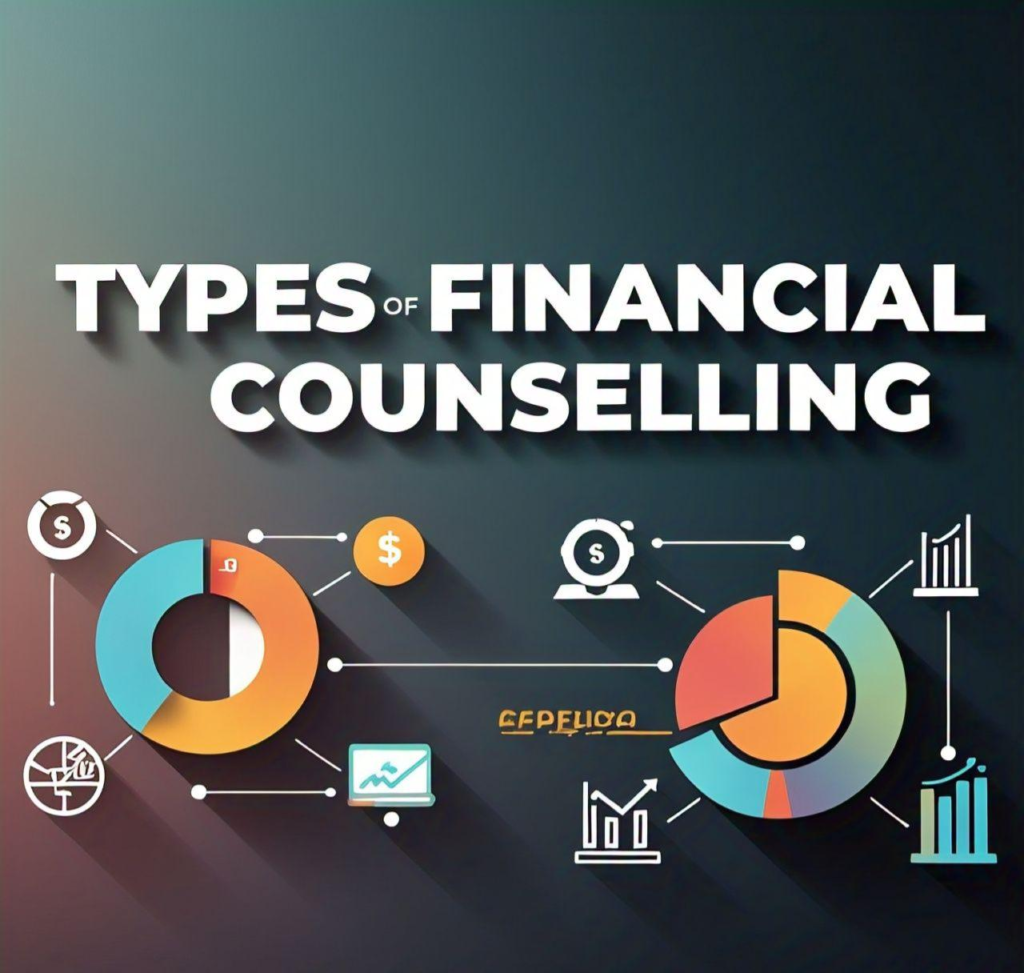TRANSFORM AND GAIN CONTROL OF YOUR FINANCES: UNLOCK THE POWER OF FINANCIAL COUNSELLING TO ACHIEVE YOUR GOALS
Unlock the power of financial counselling to transform your finances. Learn how expert advice can help you achieve your financial goals, manage debt, and build a secure future.
Are you tired of living paycheck to paycheck, struggling to make ends meet, and feeling overwhelmed by debt? Do you dream of financial freedom, security, and peace of mind? As a Canada tax expert and financial advisor in Ontario, I’m here to help you unlock the power of financial counselling to achieve your goals.
In this comprehensive guide, we’ll explore the benefits of financial counselling, identify common pain points, and provide practical solutions to help you transform your finances. Whether you’re struggling with debt, saving for retirement, or simply wanting to improve your financial literacy, this article is for you.
WHAT IS FINANCIAL COUNSELLING?
Financial counselling is a personalized service that helps individuals and families manage their finances effectively. A financial counsellor or advisor works with clients to identify their financial goals, assess their current financial situation, and develop a tailored plan to achieve their objectives.
WHY IS FINANCIAL COUNSELLING IMPORTANT?
Financial counselling offers numerous benefits that can significantly impact your financial well-being. Here are some key reasons why financial counselling is important:
- Objective Advice: Financial counsellors offer unbiased advice that is not influenced by product sales or commissions. Their primary goal is to help you achieve your financial objectives.
- Tailored Solutions: Every individual’s financial situation is unique. Financial counselling takes a personalized approach, addressing your specific needs, whether it’s managing debt, saving for a home, or planning for retirement.
- Clarity and Confidence: Financial counselling helps you gain clarity on your financial situation. With a clear understanding of your income, expenses, and financial obligations, you can make informed decisions that support your long-term goals.
- Emotional Support: Finances often carry emotional weight. Stress, anxiety, and guilt are common when dealing with financial struggles. A financial counsellor offers a safe, non-judgmental space to discuss concerns and create a plan that brings peace of mind.
- Improved Financial Skills: Through financial counselling, you’ll not only address current issues but also gain valuable skills that will serve you for a lifetime, such as budgeting, debt management, and investment basics.
HOW FINANCIAL COUNSELLING WORKS
The process of financial counselling typically unfolds in several stages:
1. Assessment and Discovery
In the first session, the financial counsellor will work with you to understand your current financial situation. This includes reviewing your income, expenses, debts, assets, and financial goals. The counsellor may also ask about your spending habits, any challenges you’re facing, and your long-term vision for your finances.
2. Goal Setting
Once the counsellor has a clear picture of your financial situation, you’ll work together to establish your financial goals. Whether you want to pay off debt, save for a home, or plan for retirement, setting concrete, measurable goals is essential for success.
3. Strategy Development
Based on your assessment and goals, the financial counsellor will create a customized strategy. This may include creating a budget, developing a debt repayment plan, identifying areas to cut costs, or recommending specific savings plans.
4. Implementation
With a clear strategy in hand, you’ll start implementing the plan. Your counsellor will help you stay on track, adjusting the plan as needed to ensure you’re moving toward your goals. Regular check-ins may be scheduled to monitor progress.
5. Ongoing Support
Financial counselling is not a one-time fix. It’s an ongoing relationship where your counsellor will provide continued support and guidance as you progress toward your goals. Whether it’s adjusting your budget or reviewing investment options, your financial counsellor will help you stay focused and adaptable to life’s changes.
TYPES OF FINANCIAL COUNSELLING

Financial counselling is a versatile service that caters to a wide variety of needs and financial situations. Whether you’re struggling with debt, planning for retirement, or looking to manage your investments, there is a type of financial counselling designed to support you. Understanding the different types of financial counselling can help you determine which approach will best serve your financial goals.
Below, we’ll break down the various types of financial counselling, so you can choose the one that’s right for you.
1. Budgeting and Expense Management Counselling
What it is:
Budgeting counselling helps individuals create and manage a realistic budget based on their income, expenses, and financial goals. A financial counsellor assists you in tracking your spending habits, identifying areas to cut costs, and setting up a practical budgeting system.
Who it’s for:
- People struggling to manage their monthly expenses or who have difficulty sticking to a budget.
- Those looking to improve their financial habits and become more conscious of their spending.
- Individuals saving for specific goals like a home, vacation, or emergency fund.
Key Benefits:
- Expense tracking: You’ll learn how to track your daily, weekly, and monthly spending and understand where your money is going.
- Savings strategies: A budget can help you allocate money towards essential expenses while setting aside savings.
- Financial discipline: Counselling helps you develop better money habits and avoid impulse spending.
– Helps individuals create a personalized budget and manage expenses effectively
– Identifies areas for cost reduction and optimization
– Develops strategies for saving and investing
2. Debt Counselling
– Assists individuals in managing and paying off debt
– Develops debt repayment plans and strategies
– Negotiates with creditors on behalf of clients
3. Investment Counselling
What it is:
Investment counselling helps individuals navigate the world of investing to build wealth over time. A financial counsellor provides insights on the types of investments suitable for your financial situation, risk appetite, and goals.
Who it’s for:
- People looking to grow their wealth through investments but who feel unsure where to start.
- Those seeking to diversify their investment portfolio.
- Individuals planning for long-term financial goals like funding education or building wealth for future generations.
Key Benefits:
- Investment strategies: Counsellors guide you in selecting the right investment vehicles, such as stocks, bonds, mutual funds, or real estate.
- Risk management: Learn how to manage investment risks while building a portfolio that suits your financial goals.
- Portfolio monitoring: Regular reviews ensure your investments are on track and aligned with your evolving financial situation.
– Provides guidance on investment options and strategies
– Helps individuals create a diversified investment portfolio
– Offers advice on retirement planning and wealth management
4. Retirement Planning Counselling
What it is:
Retirement counselling focuses on helping individuals prepare for their post-working years by creating a solid retirement plan. This includes setting up retirement accounts, estimating how much you need to save, and determining the best investment strategies to ensure a comfortable retirement.
Who it’s for:
- Individuals in their 30s, 40s, or 50s looking to start planning for retirement.
- Those who want to optimize their retirement savings strategy.
- People unsure if they’re saving enough for retirement and need advice on the best retirement accounts.
Key Benefits:
- Retirement goal estimation: Your counsellor will help you estimate how much you need to save for retirement and create a plan to reach that goal.
- Tax-efficient strategies: Counsellors can suggest tax-advantaged retirement accounts (like IRAs or 401(k)s) and help you maximize contributions.
- Investment guidance: They can assist in choosing investments that align with your retirement goals, risk tolerance, and timeline.
– Assists individuals in planning for retirement
– Develops strategies for saving and investing for retirement
– Helps individuals create a sustainable retirement income plan
5. Tax Planning and Counselling
– Provides guidance on tax planning and optimization strategies
– Helps individuals minimize tax liabilities and maximize refunds
– Offers advice on tax implications of financial decisions
6. Estate Planning Counselling
– Assists individuals in planning for the distribution of their assets after death
– Develops strategies for minimizing estate taxes and ensuring the smooth transfer of assets
– Helps individuals create a comprehensive estate plan
7. Credit Counselling
What it is:
Credit counselling focuses on helping individuals improve or repair their credit scores. This type of counselling assists in understanding credit reports, identifying errors, and providing strategies for building or restoring credit. It may also involve advising on how to manage credit cards and loans responsibly.
Who it’s for:
- Individuals with low or damaged credit scores who need help improving them.
- People facing difficulties in managing credit cards or loans.
- Anyone looking to understand how their credit score affects their financial health.
Key Benefits:
- Credit report analysis: A counsellor will review your credit report and advise you on correcting inaccuracies or disputing errors.
- Credit-building tips: Counsellors provide strategies to increase your credit score, such as paying bills on time and managing credit card balances.
- Debt-to-credit ratio management: Learn how to balance your debts relative to available credit to improve your score.
– Helps individuals improve their credit score and report
– Develops strategies for managing credit and debt
– Provides guidance on credit card management and responsible credit behaviour
8. Financial Planning Counselling
What it is:
Financial planning counselling is a more comprehensive service that covers long-term financial goals, such as retirement, buying a home, or funding education. A financial planner helps you create a plan to achieve your financial aspirations, offering advice on investments, insurance, savings, and tax planning.
Who it’s for:
- Individuals who want to set long-term financial goals and need help creating a roadmap to reach them.
- People looking to invest or save for specific major life events, such as retirement or children’s education.
- Those who want to optimize their financial strategies, including tax and investment management.
Key Benefits:
- Goal setting: Financial planning helps you define and prioritize your financial objectives, whether it’s buying a home or planning for retirement.
- Investment strategies: Counsellors guide you on how to invest wisely based on your risk tolerance and time horizon.
- Comprehensive plan: Your financial plan will address everything from saving to insurance and estate planning, providing a holistic approach.
– Assists individuals in creating a comprehensive financial plan
– Develops strategies for achieving financial goals and objectives
– Helps individuals manage financial risk and uncertainty
9. Insurance Counselling
– Provides guidance on insurance options and strategies
– Helps individuals create a comprehensive insurance plan
– Offers advice on risk management and insurance planning
10. Financial Literacy Counselling
– Educates individuals on personal finance and money management concepts
– Develops strategies for improving financial literacy and knowledge
– Helps individuals make informed financial decisions.
11. Housing and Mortgage Counselling
What it is:
Housing or mortgage counselling provides guidance on homeownership, mortgage applications, and managing housing costs. This type of counselling is particularly beneficial for first-time homebuyers or those facing difficulties with mortgage payments.
Who it’s for:
- First-time homebuyers who need guidance through the home purchasing process.
- Homeowners struggling with mortgage payments or facing foreclosure.
- Individuals seeking advice on how to refinance their mortgages or find better loan terms.
Key Benefits:
- Homebuyer education: Learn about the home buying process, from mortgage pre-approval to closing.
- Mortgage management: Counsellors help you navigate issues such as missed payments, loan modifications, and foreclosure prevention.
- Refinancing options: Get advice on refinancing to reduce monthly payments or secure better loan terms.
12. Small Business Financial Counselling
What it is:
Small business financial counselling is designed for entrepreneurs and small business owners who need help managing their business finances. Counsellors help with budgeting, cash flow management, debt management, and strategic planning to ensure the financial health of the business.
Who it’s for:
- Entrepreneurs just starting out who need assistance with business planning and financial management.
- Small business owners looking to improve cash flow, reduce business debt, or increase profitability.
- Those needing guidance on how to handle taxes, financing, and financial forecasting.
Key Benefits:
- Cash flow management: Counsellors help you understand and improve your cash flow, ensuring your business has the liquidity to grow.
- Debt management: Strategies for managing business debt without compromising operations or growth.
- Financial forecasting: Get advice on budgeting, planning for future expenses, and maximizing profitability.
There is no one-size-fits-all when it comes to financial counselling. Understanding the different types of financial counselling available will help you choose the best service based on your current financial situation and goals. Whether you’re dealing with debt, saving for a home, or planning for retirement, there’s a financial counsellor out there who can guide you every step of the way.
By selecting the right type of financial counselling, you’ll be on your way to taking control of your financial future and achieving your goals with confidence.
BENEFITS OF WORKING WITH A FINANCIAL COUNSELLOR

Here are the benefits of working with a financial counsellor:
- Personalized Financial Guidance
A financial counsellor provides tailored advice and guidance based on your unique financial situation, goals, and objectives.
2. Improved Financial Literacy
A financial counsellor educates you on personal finance and money management concepts, empowering you to make informed financial decisions.
3. Customized Financial Planning
A financial counsellor helps you create a comprehensive financial plan, addressing your specific financial goals, risk tolerance, and circumstances.
4. Debt Management and Reduction
A financial counsellor assists you in managing and paying off debt, developing a debt repayment plan and strategies to become debt-free.
5. Investment Guidance and Management
A financial counsellor provides expert advice on investment options and strategies, helping you create a diversified investment portfolio.
6. Retirement Planning and Optimization
A financial counsellor helps you plan for retirement, developing strategies for saving, investing, and generating sustainable retirement income.
7. Tax Optimization and Planning
A financial counsellor provides guidance on tax planning and optimization strategies, helping you minimize tax liabilities and maximize refunds.
8. Risk Management and Insurance Planning
A financial counsellor helps you identify and mitigate financial risks, developing strategies for insurance planning and risk management.
9. Accountability and Support
A financial counsellor provides ongoing support and accountability, helping you stay on track with your financial goals and objectives.
10. Increased Financial Confidence
By working with a financial counsellor, you’ll gain confidence in your financial decision-making, feeling more secure and in control of your financial future.
11. Improved Financial Discipline
A financial counsellor helps you develop healthy financial habits, improving your financial discipline and responsibility.
12. Enhanced Financial Flexibility
By creating a comprehensive financial plan, you’ll enjoy greater financial flexibility, allowing you to make choices that align with your values and goals.
13. Better Financial Organization
A financial counsellor helps you organize your financial affairs, simplifying your financial life and reducing stress.
14. Increased Savings and Investments
By working with a financial counsellor, you’ll develop strategies to increase your savings and investments, building wealth and securing your financial future.
15. Improved Financial Security
Ultimately, working with a financial counsellor provides peace of mind, knowing that you’re taking proactive steps to secure your financial well-being.
By working with a financial counsellor, you’ll unlock the power of financial counselling and transform your finances, achieving your financial goals and securing a brighter financial future.
BENEFITS OF FINANCIAL COUNSELLING

1. Improved Financial Literacy: A financial counsellor helps you understand personal finance concepts, investing, and money management.
2. Customized Financial Planning: A personalized plan addresses your unique financial goals, risk tolerance, and circumstances.
3. Debt Management and Reduction: One of the most common reasons individuals seek financial counselling is to get help managing debt. A financial counsellor can assess your debt situation, explore options like consolidation or negotiation, and create a plan to systematically pay down your debt. With expert guidance, you can break free from the burden of credit card debt, student loans, or personal loans.
4. Investment Guidance: Expert advice on investing in stocks, bonds, ETFs, and other assets to achieve your long-term financial goals.
5. Retirement Planning: Even if retirement seems far off, it’s never too early to start planning. A financial counsellor can help you set up retirement accounts, choose investment options, and make sure you’re putting enough away to secure your future. They’ll work with you to determine how much you need to save and the best strategies to make your retirement dreams a reality.
6. Tax Optimization: Expert guidance on tax planning, including strategies for minimizing taxes, maximizing deductions, and avoiding tax penalties.
7. Risk Management: A financial counsellor helps you identify and mitigate financial risks, including insurance, estate planning, and emergency funding.
8. Budgeting and Saving: Financial counsellors are excellent at helping individuals create realistic budgets. They’ll help you track income, identify unnecessary expenses, and find opportunities to save. By setting achievable savings goals, you can build an emergency fund, save for a vacation, or set aside money for future investments.
9. Building and Protecting Credit: Your credit score plays a significant role in your financial health. Financial counsellors can help you understand your credit report, improve your credit score, and guide you in managing credit cards and loans more effectively. They can also help you understand the importance of protecting your credit to avoid long-term financial setbacks.
10. Financial Education: Financial counsellors don’t just give you answers—they teach you how to make sound financial decisions. They’ll provide you with resources and guidance to better understand things like taxes, insurance, investing, and financial planning, empowering you to manage your finances independently in the future.
BENEFITS OF TRANSFORMING YOUR FINANCES

Transforming your finances is a journey that can lead to profound changes in your life. Whether you’re looking to get out of debt, build wealth, or simply gain more control over your money, the benefits of taking charge of your financial future are endless. The process may seem daunting at first, but the rewards you’ll reap make it all worthwhile.
Here are the key benefits of transforming your finances and how it can positively impact your life:
- Reduced Financial Stress and Anxiety
Benefit: One of the most immediate and noticeable benefits of transforming your finances is a reduction in stress and anxiety. Money is often a major source of worry for people, especially when debt is piling up or savings feel inadequate. When you take control of your finances, it provides peace of mind and a sense of empowerment.
How it helps:
- A well-structured budget helps you understand your income and expenses, giving you confidence in your ability to cover essential costs.
- Having an emergency fund means you’re prepared for unexpected expenses, eliminating the panic that often accompanies financial surprises.
- Debt reduction strategies, such as paying down high-interest debts, give you breathing room and reduce the weight of financial burdens.
2. Increased Savings, and Investment Opportunities Wealth
Benefit: One of the most exciting benefits of transforming your finances is the ability to increase your savings and explore investment opportunities. With financial discipline and a clear plan, you can grow your wealth over time and secure a more prosperous future.
How it helps:
- Once you pay down debt and reduce unnecessary expenses, you can funnel more money into savings accounts or investment portfolios.
- Regular saving and investing allow you to take advantage of compound interest and long-term growth, which builds your wealth over time.
- You may also have the opportunity to explore different investment vehicles, such as stocks, bonds, or real estate, to further secure your financial future.
3. Achieving Financial Freedom and Independence
Benefit: One of the most fulfilling outcomes of transforming your finances is the ability to achieve financial freedom. Financial freedom means having enough money to live comfortably without constantly worrying about bills, loans, or paycheck-to-paycheck living.
How it helps:
- Once you get out of debt and build a solid savings plan, you can begin to live with less financial constraint.
- Financial independence also allows you to make choices based on your values and passions, rather than being restricted by your financial situation.
- With enough savings and investments, you can reach a point where you’re not solely dependent on a regular paycheck, allowing for more flexibility in your career and personal life.
4. Better Work-Life Balance
By achieving financial stability, you’ll be able to strike a better balance between work and personal life, pursuing activities that bring you joy and fulfilment.
5. Improved Relationships
Benefit: Money is often cited as one of the leading causes of stress in relationships. By transforming your finances, you not only improve your financial situation but also the quality of your relationships, especially with your partner or family members.
How it helps:
- Couples can create shared financial goals, reducing misunderstandings and disagreements about money.
- Open communication about finances leads to stronger relationships built on trust and transparency.
- Financial harmony also reduces stress, creating a more peaceful and supportive home environment.
6. Increased Confidence and Self-Esteem
Achieving financial stability can boost your confidence and self-esteem, empowering you to pursue new opportunities and challenges.
7. Greater Financial Independence
Transforming your finances helps you achieve greater financial independence, reducing reliance on others for financial support.
8. Improved Physical and Mental Health
By reducing financial stress and anxiety, transforming your finances can also improve your physical and mental health, leading to a happier, healthier life.
9. Better Retirement Prospects
Transforming your finances helps you build a secure retirement foundation, ensuring a comfortable and fulfilling post-work life.
10. Improved Credit Score and Financial Health
Benefit: A well-managed financial transformation plan can help you improve your credit score and overall financial health. This leads to lower interest rates on loans, better approval odds for credit cards and mortgages, and an overall better financial reputation.
How it helps:
- By paying off debt, especially high-interest credit card debt, you lower your debt-to-income ratio, which boosts your credit score.
- Regular, on-time payments to credit accounts and reduced balances on credit cards lead to a more favorable credit history.
- A higher credit score makes it easier to access loans, secure better credit card terms, and lower the cost of borrowing over time.
11. Reduced Debt and Financial Burden
Transforming your finances helps you develop strategies to reduce debt, eliminate financial burdens, and achieve financial freedom.
12. Increased Financial Resilience
By building an emergency fund and developing a financial safety net, transforming your finances helps you weather financial storms and unexpected expenses.
13. Greater Sense of Accomplishment and Pride
Benefit: One of the most fulfilling benefits of transforming your finances is the sense of accomplishment and empowerment it brings. The process of gaining control over your finances and making sound financial decisions gives you confidence in your ability to achieve any goal.
How it helps:
- Paying off debt or reaching a savings milestone provides a tangible sense of success and motivation to continue improving.
- You’ll feel empowered to make more informed financial decisions in the future, whether it’s planning for retirement or making investment choices.
- As you reach each financial goal, the confidence you gain propels you forward to set even bigger, more ambitious goals.
14. Long-Term Financial Security and Stability
Benefit: At its core, transforming your finances is about achieving long-term financial security. By paying down debt, building an emergency fund, and investing for the future, you can ensure stability for yourself and your loved ones, regardless of unexpected financial challenges.
How it helps:
- Financial security gives you the freedom to handle emergencies without falling into debt or financial turmoil.
- Stable finances provide a cushion against economic fluctuations, job loss, or other uncertainties.
- You’ll have the confidence to navigate life’s ups and downs without fear of financial ruin.
15. Increased Opportunities for Personal Growth
Benefit: Taking charge of your finances is not just about the numbers; it’s also an opportunity for personal growth. It encourages discipline, responsibility, and forward-thinking—all of which can enhance your overall quality of life.
How it helps:
- Managing your finances requires setting clear goals, staying organized, and being accountable to yourself—all of which are transferable skills that can help in other areas of life.
- As you transform your financial habits, you develop a greater sense of self-worth and confidence, knowing that you are taking control of your financial destiny.
- Financial transformation often prompts reflection on your priorities, helping you align your spending and goals with your personal values.
16. Achieving Long-Term Goals (Homeownership, Travel, Retirement)
Benefit: Transforming your finances puts you in a stronger position to achieve long-term life goals. Whether it’s buying a home, going on a dream vacation, or securing a comfortable retirement, having a solid financial foundation gives you the ability to plan for the future.
How it helps:
- You’ll have a clear roadmap for how much you need to save for major life events, helping you stay on track and motivated to reach your goals.
- With proper budgeting and debt management, you can save for large purchases like a house or car without relying on credit or loans.
- Preparing for retirement through smart savings and investments ensures that you can enjoy your golden years without worrying about financial instability.
17. Better Control Over Spending and Saving
Benefit: Transforming your finances involves creating and sticking to a budget, which directly improves your ability to manage spending and saving. By having clear financial goals and a strategy in place, you’ll gain better control over where your money goes.
How it helps:
- Budgeting forces you to prioritize necessary expenses and eliminate wasteful spending, helping you allocate more money toward savings and investments.
- You can set aside funds for short-term goals (like vacations or home repairs) and long-term objectives (such as retirement or college savings).
- With a clearer understanding of your income and expenses, you’re less likely to make impulse purchases that may negatively affect your financial health.
Transforming your finances is more than just a number game—it’s about taking control of your future, reducing stress, and achieving the life you’ve always dreamed of. Whether it’s saving for a home, paying off debt, or investing for the future, the benefits of financial transformation are vast and far-reaching.
By taking proactive steps today, you can unlock a world of possibilities and set yourself on the path to financial freedom. The rewards—peace of mind, financial security, and the ability to live life on your own terms—are well worth the effort. So, start transforming your finances now and watch as your life begins to change for the better!
COMMON PAIN POINTS AND SOLUTIONS

Here are some common pain points and solutions:
Pain Point 1: Debt Overwhelm
– Symptoms: High-interest debt, multiple creditors, feeling overwhelmed
– Solutions:
– Debt consolidation and management
– Negotiating with creditors
– Creating a debt repayment plan
– Considering debt counselling or credit counselling services
Pain Point 2: Financial Stress and Anxiety
– Symptoms: Feeling overwhelmed, anxious, or stressed about finances
– Solutions:
– Creating a budget and financial plan
– Prioritizing needs over wants
– Building an emergency fund
– Practicing mindfulness and self-care
Pain Point 3: Retirement Uncertainty
– Symptoms: Uncertainty about retirement savings, income, or security
– Solutions:
– Creating a retirement plan and strategy
– Contributing to tax-advantaged retirement accounts (e.g., RRSP, TFSA)
– Exploring alternative income sources (e.g., annuities, rental properties)
– Reviewing and adjusting retirement plans regularly
Pain Point 4: Investment Confusion
– Symptoms: Uncertainty about investment options, risk tolerance, or strategy
– Solutions:
– Consulting with a financial advisor or investment professional
– Developing a diversified investment portfolio
– Understanding investment fees and expenses
– Regularly reviewing and adjusting investment strategies
Pain Point 5: Tax Complexity
– Symptoms: Uncertainty about tax laws, regulations, or implications
– Solutions:
– Consulting with a tax professional or financial advisor
– Understanding tax implications of financial decisions
– Exploring tax optimization strategies (e.g., tax-loss harvesting, charitable donations)
– Staying informed about tax law changes and updates
Pain Point 6: Financial Procrastination
– Symptoms: Delaying financial decisions, avoiding financial planning
– Solutions:
– Breaking down financial tasks into smaller, manageable steps
– Creating a financial plan and timeline
– Seeking accountability and support from a financial advisor or accountability partner
– Celebrating small financial wins and milestones
Pain Point 7: Lack of Financial Literacy
– Symptoms: Limited understanding of personal finance concepts, terminology
– Solutions:
– Seeking financial education and resources (e.g., books, articles, workshops)
– Consulting with a financial advisor or financial educator
– Using online financial tools and resources (e.g., budgeting apps, financial calculators)
– Joining a financial community or support group
Pain Point 8: Financial Infidelity
– Symptoms: Hiding financial information, spending, or debt from partner or spouse
– Solutions:
– Practicing transparency and honesty in financial discussions
– Creating a shared financial vision and goals
– Establishing a joint budget and financial plan
– Seeking counselling or therapy to address underlying issues
Pain Point 9: Financial Overwhelm
– Symptoms: Feeling overwhelmed by financial responsibilities, tasks, or decisions
– Solutions:
– Breaking down financial tasks into smaller, manageable steps
– Delegating financial tasks or responsibilities when possible
– Seeking support from a financial advisor, accountability partner, or financial community
– Practicing self-care and stress management techniques
Pain Point 10: Financial Regret
– Symptoms: Feeling regret or disappointment about past financial decisions
– Solutions:
– Practicing self-compassion and forgiveness
– Learning from past financial mistakes
– Creating a new financial plan and strategy
– Seeking support from a financial advisor or therapist.
PRACTICAL TIPS FOR TRANSFORMING YOUR FINANCES

Here are some practical tips for transforming your finances:
Budgeting and Expense Management
1. Track Your Expenses: Use a budgeting app or spreadsheet to monitor your spending.
2. Create A Budget: Allocate 50-30-20: 50% for necessities, 30% for discretionary spending, and 20% for saving and debt repayment.
3. Prioritize Needs Over Wants: Distinguish between essential expenses and discretionary spending.
4. Cut Unnecessary Expenses: Identify areas for cost reduction and optimization.
Debt Management and Reduction
1. List Your Debts: Create a comprehensive list of debts, including balances, interest rates, and minimum payments.
2. Develop A Debt Repayment Plan: Prioritize high-interest debt, consider debt consolidation or balance transfer options.
3. Pay More Than The Minimum: Increase debt repayment amounts to accelerate payoff.
4. Consider Debt Counselling: Seek professional guidance for complex debt situations.
Saving and Investing
1. Set Financial Goals: Define short-term and long-term objectives, such as saving for a emergency fund, retirement, or a down payment.
2. Automate Savings: Set up automatic transfers to savings and investment accounts.
3. Take Advantage Of Tax-Advantaged Accounts: Utilize RRSPs, TFSAs, and other tax-advantaged accounts for retirement and other savings goals.
4. Diversify Investments: Spread investments across asset classes, such as stocks, bonds, and real estate.
Financial Planning and Organization
1. Create A Financial Plan: Develop a comprehensive plan addressing financial goals, risk tolerance, and circumstances.
2. Organize Financial Documents: Keep important documents, such as tax returns, insurance policies, and investment statements, in a secure and accessible location.
3. Monitor Credit Reports: Regularly review credit reports to ensure accuracy and detect potential identity theft.
4. Develop A Financial Emergency Kit: Prepare for unexpected events, such as job loss or medical emergencies, by building an emergency fund and creating a contingency plan.
Retirement planning and optimization
1. Start Early: Begin saving for retirement as soon as possible to take advantage of compound interest.
2. Maximize Employer Matching: Contribute enough to employer-sponsored retirement plans to maximize matching contributions.
3. Diversify Retirement Income: Consider alternative income sources, such as annuities or rental properties, to supplement retirement income.
4. Review And Adjust Retirement Plans: Regularly review retirement plans and adjust as needed to ensure alignment with changing financial goals and circumstances.
Tax Planning and Optimization
1. Understand Tax Implications: Consider tax implications of financial decisions, such as investments or retirement withdrawals.
2. Take Advantage Of Tax Deductions: Claim eligible tax deductions, such as charitable donations or mortgage interest.
3. Utilize Tax Credits: Claim tax credits, such as the Basic Personal Amount or the Canada Child Benefit.
4. Consult A Tax Professional: Seek guidance from a tax professional to optimize tax planning and minimize tax liabilities.
Risk Management and Insurance Planning
1. Assess Risk Tolerance: Understand personal risk tolerance and adjust financial plans accordingly.
2. Develop A Risk Management Plan: Identify potential risks, such as disability or premature death, and develop strategies to mitigate them.
3. Review Insurance Coverage: Ensure adequate insurance coverage, including life, disability, and health insurance.
4. Consider Alternative Risk Management Strategies: Explore alternative risk management strategies, such as hedging or diversification.
Financial Literacy and Education
1. Seek Financial Education: Pursue financial education through books, articles, workshops, or online courses.
2. Consult Financial Experts: Seek guidance from financial experts, such as financial advisors or planners.
3. Stay Informed: Stay up-to-date on personal finance news, trends, and best practices.
4. Join A Financial Community: Connect with others who share similar financial goals and interests.
Accountability and Support
1. Find An Accountability Partner: Share financial goals and progress with a trusted friend or family member.
2. Join A Financial Support Group: Connect with others who share similar financial challenges and goals.
3. Seek Professional Guidance: Consult a financial advisor or planner for personalized guidance and support.
4. Celebrate Milestones: Acknowledge and celebrate progress toward financial goals.
FREQUENTLY ASKED QUESTIONS
1. What is financial counselling, and how can it help me?
Answer: Financial counselling is a personalized service that helps individuals and families manage their finances effectively. A financial counsellor can help you create a budget, develop a debt repayment plan, invest in your future, and achieve your financial goals.
2. How do I know if I need financial counselling?
Answer: If you’re struggling with debt, living paycheck to paycheck, or feeling overwhelmed by financial decisions, you may benefit from financial counselling. A financial counsellor can help you identify areas for improvement and develop a personalized plan to achieve financial stability.
3. What is the difference between a financial counsellor and a financial advisor?
Answer: A financial counsellor typically focuses on helping clients manage debt, create budgets, and develop financial plans. A financial advisor, on the other hand, often focuses on investment advice and wealth management. Some professionals may offer both services.
4. How much does financial counselling cost?
Answer: The cost of financial counselling varies depending on the provider, services offered, and your location. Some non-profit credit counselling agencies offer free or low-cost services, while private financial counselors may charge hourly or flat fees.
5. What should I expect during a financial counselling session?
Answer: During a financial counselling session, you can expect to discuss your financial goals, income, expenses, debts, and assets. The counsellor will help you identify areas for improvement and develop a personalized plan to achieve financial stability.
6. How long does financial counselling take?
Answer: The length of financial counselling varies depending on your individual needs and goals. Some clients may require only one or two sessions, while others may benefit from ongoing counselling and support.
7. Is financial counselling confidential?
Answer: Yes, financial counselling is typically confidential. Financial counselors are bound by professional ethics and standards to maintain client confidentiality.
8. Can financial counselling help me get out of debt?
Answer: Yes, financial counselling can help you develop a plan to get out of debt. A financial counsellor can help you prioritize debts, negotiate with creditors, and create a budget that allows you to make progress on debt repayment.
9. Can financial counselling help me improve my credit score?
Answer: Yes, financial counselling can help you improve your credit score. A financial counsellor can help you understand how credit scores work, identify areas for improvement, and develop a plan to improve your credit score over time.
10. How can I find a financial counsellor?
Answer: You can find a financial counsellor through professional associations, such as the Financial Planning Association (FPA) or the National Foundation for Credit Counselling (NFCC). You can also ask friends, family, or co-workers for recommendations.
THINGS TO AVOID WHEN TRANSFORMING YOUR FINANCES

Here are some things to avoid when transforming your finances:
- Procrastination: Delaying financial decisions or putting off financial planning can lead to missed opportunities, increased debt, and reduced financial security.
2. Emotional Decision-Making: Making impulsive financial decisions based on emotions can lead to poor financial choices, such as buying on impulse or making reckless investments.
3. Lack of Budgeting: Failing to create and stick to a budget can lead to overspending, debt, and financial instability.
4. High-Interest Debt: Accumulating high-interest debt, such as credit card debt, can lead to financial distress and make it difficult to achieve financial goals.
5. Not Having an Emergency Fund: Failing to build an emergency fund can leave you vulnerable to financial shocks, such as job loss or unexpected expenses.
6. Not Diversifying Investments: Failing to diversify investments can lead to increased risk and reduced potential returns.
7. Not Reviewing and Adjusting Financial Plans: Failing to regularly review and adjust financial plans can lead to stagnation and missed opportunities.
8. Not Seeking Professional Advice: Failing to seek professional advice from a financial counsellor or advisor can lead to poor financial decisions and missed opportunities.
9. Not Considering Long-Term Consequences: Failing to consider the long-term consequences of financial decisions can lead to poor financial choices and reduced financial security.
10. Not Being Patient and Disciplined: Failing to be patient and disciplined in financial decision-making can lead to impulsive choices and reduced financial progress.
11. Not Avoiding Lifestyle Inflation: Failing to avoid lifestyle inflation, such as spending more as income increases, can lead to reduced savings and investments.
12. Not Considering Tax Implications: Failing to consider tax implications of financial decisions can lead to increased tax liabilities and reduced financial efficiency.
13. Not Building Multiple Income Streams: Failing to build multiple income streams can lead to reduced financial security and increased vulnerability to financial shocks.
14. Not Prioritizing Needs Over Wants: Failing to prioritize needs over wants can lead to overspending, debt, and financial instability.
15. Not Being Aware of Financial Biases: Failing to be aware of financial biases, such as confirmation bias or loss aversion, can lead to poor financial decisions and reduced financial progress.
CONCLUSION
Financial counselling is a powerful tool that can help you transform your finances and achieve your goals. With the guidance of a skilled counsellor, you can take control of your financial future, reduce debt, increase savings, and make smarter financial decisions. Whether you’re just starting out or need help navigating complex financial challenges, financial counselling is the key to unlocking the financial freedom you deserve.
Invest in your financial well-being today, and start working towards the life you’ve always dreamed of with the support and expertise of a professional financial counsellor.
In conclusion, transforming your finances requires a comprehensive approach that incorporates financial counselling, practical planning, and ongoing support. By understanding the benefits of financial counselling, identifying common pain points, and implementing practical tips, you can unlock the power of financial counselling and achieve your financial goals.
Remember, financial transformation is a journey, not a destination. It requires patience, discipline, and a willingness to learn and adapt. By avoiding common pitfalls, staying informed, and seeking professional guidance when needed, you can overcome financial challenges and achieve long-term financial success.
As you embark on this journey, remember that financial counselling is not a one-size-fits-all solution. It’s a personalized approach that takes into account your unique financial situation, goals, and objectives. By working with a financial counsellor or advisor, you can create a tailored plan that addresses your specific needs and helps you achieve financial freedom.
In the end, transforming your finances is not just about managing money; it’s about creating a better life. It’s about reducing financial stress, increasing financial confidence, and achieving long-term financial security. By unlocking the power of financial counselling, you can take control of your finances, achieve your goals, and live the life you deserve.
CALL TO ACTION
If you’re ready to transform your finances and achieve your financial goals, take the first step today. Book a consultation with our financial counsellor or advisor, and start your journey towards financial freedom. Remember, the power to transform your finances is in your hands. Unlock it today!
ABOUT AUTHOR
Shanel John is a dedicated Certified Public Accountant (CPA) at G.L.H. Accounting, specializing in Income Tax with 10 years of experience. Based in Brampton, Ontario, Canada, Shanel offers expertise in tax preparation, financial accounting, and advisory services. A certified QBO Pro Advisor, Shanel’s decade-long experience and knowledge make her a trusted figure in the accounting field.
ADDITIONAL RESOURCES
GOVERNMENT RESOURCES
1. Financial Consumer Agency of Canada (FCAC): https://www.fcac-acfc.gc.ca/
2. Canada Revenue Agency (CRA): https://www.cra-arc.gc.ca/

